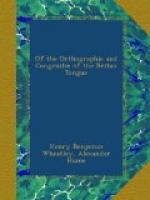2. But, contrarie to this sure ground, I waet not be quhat corruption, we see, not onelie in our idiom, but in the latin alsoe, one symbol to have sundrie soundes, ye, and that in one word; as, lego, legis.
3. First, to begin with c, it appeeres be the greekes, quho ever had occasion to use anie latin word, quharein now we sound c as s, in their tymes it sounded k; for Cicero, thei wryt Kikero; for Caesar, Kaisar; and Plut., in Galba, symbolizes principia, +prinkipia+.
{Transcriber’s Note:
The word is written with nu, not gamma.}
4. This sound of it we, as the latines, also keepe befoer a, o, and u; as, canker, conduit, cumber. But, befoer e and i, sum tymes we sound it, with the latin, lyke an s; as, cellar, certan, cease, citie, circle, etc.
5. Behind the voual, if a consonant kep it, we sound it alwayes as a k; as, occur, accuse, succumb, acquyre. If it end the syllab, we ad e, and sound it as an s; as, peace, vice, solace, temperance; but nether for the idle e, nor the sound of the s, have we anie reason; nether daer I, with al the oares of reason, row against so strang a tyde. I hald it better to erre with al, then to stryve with al and mend none.
6. This consonant, evin quher in the original it hes the awne sound, we turn into the chirt we spak of, cap. 4, sect. 14, quhilk, indeed, can be symbolized with none, neither greek nor latin letteres; as, from cano, chant; from canon, chanon; from castus, chast; from +kyriake:+, a church, of q_uhi_lk I hard doctour Laurence, the greek professour in Oxfoord, a man bothe of great learni_n_g and judgement, utter his opinion to this sense, and (excep my memorie fael me) in these wordes: +kyriake:+ ut +basilike:+ suppresso substantivo +oikia+ domus domini est. Unde nostrum derivatur, quod Scoti et Angli boreales recte, pronu_n_ciant a kyrk, nos corrupte a church.
7. Yet, notwithstanding that it is barbarouse, seing it is more usual in our tongue then can be mended befoer the voual, as chance, and behind the voual, as such, let it be symbolized, as it is symbolized with ch, hou beit nether the c nor the h hath anie affinitie with that sound; 1, because it hath bene lang soe used; and 2, because we have no other mean to symbolize it, except it wer with a new symbol, q_uhi_lk it will be hard to bring in use.
8. Now, quheras ch in nature is c asperat, as it soundes in charus and chorus; and seing we have that sound also in use, as licht, micht; if I had bene at the first counsel, my vote wald have bene to have geven ch the awn sound. But as now the case standes, ne quid novandum sit, quod non sit necesse, I not onlie consent, but also com_m_end the wisdom of the south, quho, for distinction, wrytes light, might, with gh and referres ch to the other sound, how be it improperlie, and this distinction I com_m_end to our men, quho yet hes not satis attente observed it.
9. Next cumes g, howbe it not so deformed as c; for, althogh we see it evin in latin, and that, in one word (as is said cap. 5, sect. 2), distorted to tuo sonndes, yet both may stand with the nature of the symbol and differ not in the instrumentes of the mouth, but in the form of the tuich, as the judiciouse ear may mark in ago, agis; agam, ages.




